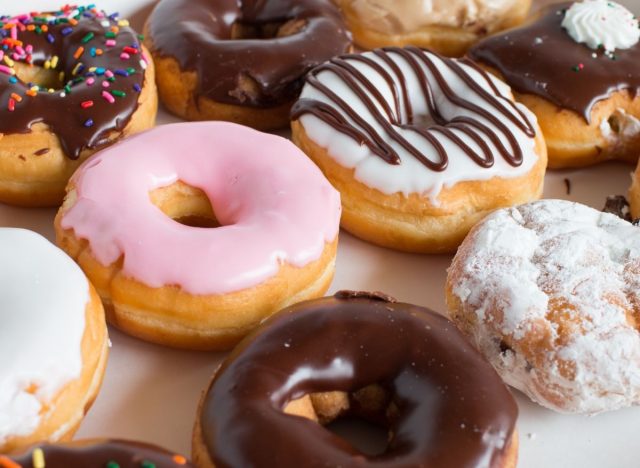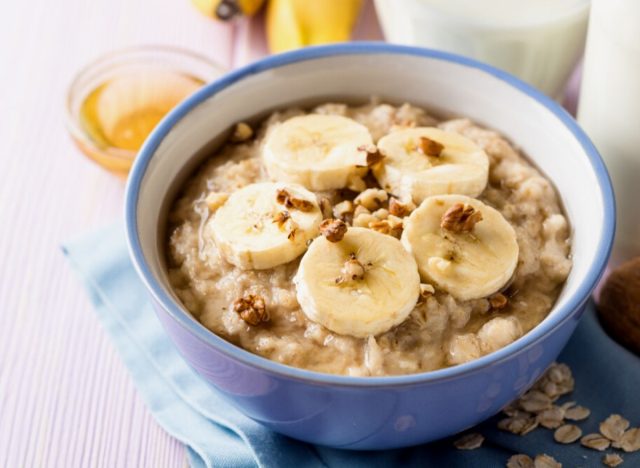Breakfast Habits Aging Your Brain Faster

They always say that breakfast is the most important meal of the day, and there's definitely some truth to this. But what also matters is the type of breakfast you're eating on a regular basis, especially as you get older.
Fitting in the right nutrients during meals is a helpful way to slow the natural aging process, and this includes what you eat at breakfast, too. To learn more about how your breakfast can affect your cognitive aging, we talked with Morgyn Clair, MS, RDN, author at Fit Healthy Momma.
Read more to learn about common breakfast habits aging your brain faster, and for more healthy eating tips check out the 4 Worst Breakfast Habits for Blood Sugar According to Dietitians.
Eating too many highly processed foods

"Many highly processed breakfast foods, like cereals and breakfast meats, can accelerate brain aging because of the high sodium and sugar content," says Clair.
A recent Brazilian study found that people whose calorie intake consisted of 20% or more of processed foods experienced cognitive decline at a rate 28% faster than average. At the conference where these findings were presented, researchers stated that 58% of calories consumed by Americans are from processed foods.
Common processed breakfast foods include things like bacon, sausage, donuts, prepackaged pastries like muffins, and sugary cereals. If you can, protect your brain health by limiting your consumption of these foods.
Not incorporating veggies

"Skipping out on leafy greens and richly colored vegetables is a mistake at breakfast because they can help provide so many valuable brain health promoters like antioxidants and vitamins," says Clair, "and the brain will naturally require more antioxidants as we age, due to the aging process because they can help prevent age-related changes."
A study published in Neurology found that consuming even just one serving of leafy greens per day had a positive impact on slowing the rate of cognitive decline in aging adults. The greens they focused on were spinach, collard greens, kale, and lettuce salad.
To incorporate more veggies into your breakfast, try adding them to your omelet or make one of these delicious breakfast salads.
Not including enough fiber

"Fiber helps promote a healthy gut-brain connection and can help mitigate so many diseases that are associated with the general aging process, like decreased gut function, high cholesterol, and cognitive aging," says Clair.
This gut-brain connection is important at any age, but especially as we get older. Certain types of fiber, like prebiotic fiber, serve as the top food source for the healthy bacteria that live in our gut microbiome. Without fiber, your gut microbiome won't contain as many healthy bacteria. One study found that a diet low in fiber contributed to greater cognitive decline because of the way the low-fiber diet affected the gut microbiome.
If you're looking for ways to get a fiber boost in the morning, try a cozy bowl of oatmeal or a piece of whole grain toast topped with avocado or nut butter.
Skipping breakfast

It's one thing to eat an "unhealthy" breakfast, but skipping breakfast on a regular basis can significantly impact your cognitive health as you age.
A study published in BMC Public Health found that not eating breakfast or consuming a breakfast that isn't nutrient-dense can contribute to faster cognitive decline. One of the main reasons they cited was that glucose is an important component of a healthy, functioning brain, and your breakfast helps you manage your blood glucose levels and restore your depleted glycogen from the hours you spent sleeping.
If you're used to skipping breakfast because you're always on the go or in a hurry, try having some pre-made meals on hand like overnight oats.









